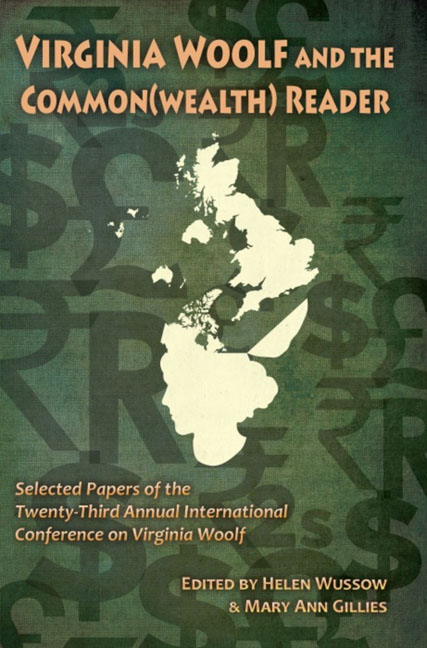Book contents
- Frontmatter
- Contents
- Introduction to Virginia Woolf and the Common(wealth) Reader
- Acknowledgments
- List of Abbreviations
- Invocations
- Networks of Affiliation: Foundations and Friends
- Woolf and the Commonwealth
- 1930s Onwards
- Woolf Beyond the Book
- Preserving Our History of Reading Woolf: The Common Wealth of Our Past and Future
- Adventures in Common: Investing with Woolfs and ”Securitas”
- Printing “Prelude”: Virginia Woolf's Typsetting Apprenticeship and Katherine Mansfield on “Other People's Presses”
- The Hogarth Press, Digital Humanities, and Collaboration: Introducing the Modernist Archives Publishing Project (MAPP)
- Woolf Blogging, Blogging Woolf: Using the Web to Create a Common Wealth of Global Scholars-Readers
- Notes on Contributors
- Conference Program
Woolf Blogging, Blogging Woolf: Using the Web to Create a Common Wealth of Global Scholars-Readers
from Woolf Beyond the Book
- Frontmatter
- Contents
- Introduction to Virginia Woolf and the Common(wealth) Reader
- Acknowledgments
- List of Abbreviations
- Invocations
- Networks of Affiliation: Foundations and Friends
- Woolf and the Commonwealth
- 1930s Onwards
- Woolf Beyond the Book
- Preserving Our History of Reading Woolf: The Common Wealth of Our Past and Future
- Adventures in Common: Investing with Woolfs and ”Securitas”
- Printing “Prelude”: Virginia Woolf's Typsetting Apprenticeship and Katherine Mansfield on “Other People's Presses”
- The Hogarth Press, Digital Humanities, and Collaboration: Introducing the Modernist Archives Publishing Project (MAPP)
- Woolf Blogging, Blogging Woolf: Using the Web to Create a Common Wealth of Global Scholars-Readers
- Notes on Contributors
- Conference Program
Summary
Virginia Woolf was a journalist, a novelist, and a publisher. If she were alive today, would she also be a blogger? In her day, Woolf used radio airwaves, the cutting edge medium of her day, to communicate with her readers. If she were writing today, I believe she would have embraced the World Wide Web, the medium that has revolutionized publishing and other forms of communication, to share her art. The fact that Woolf's online popularity has grown, rather than decreased, since the early 1990s, a time when material of all kinds began flooding the Web, supports that premise. Her message, her style, and her popular persona all combine to make her a growing online commodity. As a result, the quantity of websites presenting Woolf-related facts and commentary continues to multiply at a rapid pace. Consider the numbers. In “Who's Afraid that Feminism Is Finished? Virginia Woolf and Contemporary Commodification,” Jane Wood reported that on 9 January 2007, she conducted a Google search on Woolf's name and came up with 2.4 million hits (22). When I conducted the same search two and a half years later, on 27 June 2009, the number had increased to 2.7 million, a ten percent jump. On 10 May 2012, I did another Google search that produced nearly double that number, at 4.08 million hits. Today, a year later, the number of hits on Woolf's name has more than doubled again—to 8.24 million. It is clear that Woolf is a World Wide Web phenomenon whose popularity continues to climb at a dizzying pace.
Blogging is part of that online picture. And I maintain that Woolf would approve of publishing online via a blog for several reasons, including the fact that blogging is the modern day version of the Hogarth Press. When Virginia and Leonard Woolf created the Hogarth Press in 1917, they were able to control their own means of publication. Blogging allows us to do the same thing today. It provides the opportunity to do what Woolf advocates in Three Guineas (1938)—seize the methods of production in order to share our own truths about politics and history, art and culture, and society at large.
- Type
- Chapter
- Information
- Virginia Woolf and the Common(wealth) Reader , pp. 232 - 237Publisher: Liverpool University PressPrint publication year: 2014



